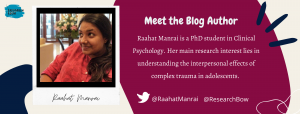We are back with that time of the year! The time where we gather our drafts together and start on to work towards consolidating everything we have worked for an entire year.
 It is never easy, especially for the first years who no doubt have heard of the annual review progression right from the first day of their PhD’s and the endless chatter on other academic and social forums, from their slightly senior peers.
It is never easy, especially for the first years who no doubt have heard of the annual review progression right from the first day of their PhD’s and the endless chatter on other academic and social forums, from their slightly senior peers.
Annual review is indeed an important milestone, especially during the first year, as it might be the first point of a formal feedback from their supervisory team or a chance to show their thoughts, present their work and finally move onto the next stages within their PhD journeys.
Rowena Piers, a second year PhD student in Clinical Psychology has been kind enough to share her experiences of her first-year annual review. Her research broadly focusses on digital mental health interventions for socially marginalised youth. She passed her annual review, and with flying colours, no less!
On asking about her experience of the review itself, she mentioned it being a conducive discussion amongst her supervisors and her critical friend.
“I was initially quite hesitant and nervous because everyone talks about how daunting the whole process is, but then when I went into the actual meeting, I realised it was more of a discussion about what have I done in the first year, rather than being evaluated.”
“My critical friend was actually that- a friend, someone who made me feel quite at ease and did not make me feel nervous at all. They had so much positive and helpful feedback, advise and input to share, which gave me a lot of positive critique about my own project which would definitely be beneficial for me, going forward.”
 Now, we all know about the actual process of the review, which includes your supervisory team along with a critical friend, who acts as an external to examine your progression along with checking in to see if the entire team is best fit for you and is fulfilling your needs along with your research demands. A critical friend is usually appointed by your own supervisors and they are a faculty member with experience in your broader research focus. While a lot of preparation goes into preparing for the review meeting, it actually involves a small presentation (which is optional), followed by a discussion amongst your supervisors and critical friend. While a lot of students are conflicted on actually presenting at the review meeting, Rowena feels it is imperative for the student to actually use that opportunity to do a small presentation, just discussing the salient features within your research focus and discussing your future plans. She suggests it takes the edge off along with giving the student an important chance to get hold on their nerves.
Now, we all know about the actual process of the review, which includes your supervisory team along with a critical friend, who acts as an external to examine your progression along with checking in to see if the entire team is best fit for you and is fulfilling your needs along with your research demands. A critical friend is usually appointed by your own supervisors and they are a faculty member with experience in your broader research focus. While a lot of preparation goes into preparing for the review meeting, it actually involves a small presentation (which is optional), followed by a discussion amongst your supervisors and critical friend. While a lot of students are conflicted on actually presenting at the review meeting, Rowena feels it is imperative for the student to actually use that opportunity to do a small presentation, just discussing the salient features within your research focus and discussing your future plans. She suggests it takes the edge off along with giving the student an important chance to get hold on their nerves.
“I would probably advise all students to present, however short their presentation might be. It gives a lot of control to the student within the meeting and allows them to present their ideas and thoughts.”
 The review process can result in either the obvious progression to subsequent year or with some feedback, leading to another review being conducted within the span of 3 months. The first-year review usually means checking in with the student and creating a research path for them to walk on for the next 3 years which will then determine the course for the rest of the PhD. Most students do get quite anxious over it and rightfully so, but always remember these points are checkpoints for the school to see that you’re on the right path and are fulfilling the fundamental requirements of a hard and an arduous PhD programme.
The review process can result in either the obvious progression to subsequent year or with some feedback, leading to another review being conducted within the span of 3 months. The first-year review usually means checking in with the student and creating a research path for them to walk on for the next 3 years which will then determine the course for the rest of the PhD. Most students do get quite anxious over it and rightfully so, but always remember these points are checkpoints for the school to see that you’re on the right path and are fulfilling the fundamental requirements of a hard and an arduous PhD programme.
While the annual review process is an important milestone that everyone has to go through, it is an important checkpoint for a PhD student since it gives us scope to take a step back from actively working on our research and look at it from different perspective. It will inevitably change throughout the course of 3 years and feedback and advise from your reviewers (Supervisors & Critical Friend) will help us achieve that.
“I was quite inspired after my review meeting. It made me feel happy that my efforts were not in vain and I got good feedback along with some interesting points to keep in mind for my work going forward.”
As long as you are quite realistic with your research approach and are mindful with your preparation, you should be fine. It is a point of progression (which has been repeatedly reiterate here) and should be seen as such.
So, for all the first year PhD students approaching their review, a big bowl of good luck! We assure these nerves won’t last for long!
Rowena Piers is a second year PhD student in Clinical Psychology. Her research involves studying digital mental health interventions for socially marginalised youth. She is also one of the PGR Representatives in the school. You can contact her on R.Piers@ed.ac.uk. Her Twitter Handle is @rowenapiers.





